
What are semiconductors and how are they used?
Governments around the world are scrambling to boost semiconductor production.
2023-08-04 00:50

Spirit Air Expects More Groundings as Pratt Engine Fallout Grows
Spirit Airlines Inc. has grounded seven planes due to problems with its Pratt & Whitney engines and the
2023-08-04 00:49

Post Malone pays fan $2m for Magic: The Gathering 'One Ring' card
A Toronto man says the artist gave him a beer to celebrate the sale, a day before his 37th birthday.
2023-08-04 00:47

Fact check: The day after his indictment, Trump lies again about Pence's powers on January 6
The day after former President Donald Trump was indicted over his efforts to overturn the outcome of the 2020 election, Trump repeated a lie that the indictment depicts as central to his attempt to obstruct the congressional certification of Joe Biden's victory.
2023-08-04 00:45
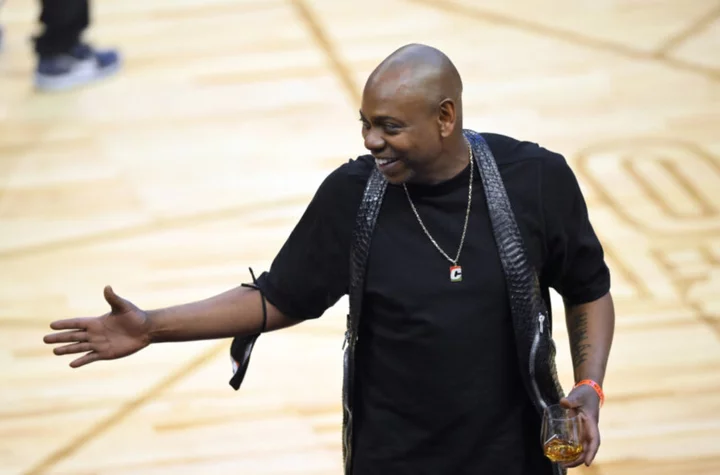
Kyle Kuzma gets leg tattoo of infamous Dave Chapelle character
Kyle Kuzma is continuing to set trends, inking his calf with his favorite character from the Chappelle Show.Kyle Kuzma is arguably as known for his fashion choices as for his basketball accomplishments. There's the colorfully striped, possibly hand-knitted ski mask. The supervillain, black-...
2023-08-04 00:28

Teacher says students are 'tormenting' her with new 'coin boys' flipping trend
In schools, trends come and go like clockwork, whether they be related to a toy like fidget spinners or pranks they have seen on the internet. One teacher has opened up about a new and “annoying quirk” that has young people calling themselves “coin boys” and constantly flipping quarters. The anonymous teacher took to Reddit to complain about freshmen they teach participating in the “coin boys” trend. The hilarious post explained: “The newest thing here is a flock of self-proclaimed ‘coin boys’ who carry a quarter on hand at all times and constantly flip it. Sign up to our free Indy100 weekly newsletter “They have their entire personality revolve around coins, coin flips, and chance. When we went around doing an ice-breaker, 4 or 5 of the kids said some variation of ‘I live by the coin and die by the coin’ as their fact.” In the post, the teacher said one of the “coin boys” said he was going to flip a coin that would decide if he was going to do the assigned piece of work or not. The teacher explained: “When I assigned the first assignment of the school year, one of the coin boys was bold enough to say ‘heads I do it, tails I don’t.’ “I told him if he flipped the coin he would be getting a call home on the first week of HS. He flipped it anyway and it came up heads (thank god for that at least). “But then the other coin boy in that class flipped his coin and it came up tails. He said the coin has spoken and he’s not doing it. I say very well, enjoy your 0 and your call home— what a great way to start off the school year and your high school career.” Their post proceeded to go viral across social media, with many finding the post absolutely hilarious and pledging to “stand with the coin boys”. The teacher said they had looked up the trend online but hadn’t seen anything else about it, theorising that it must be a local group of friends who made it up. But, thanks to the viral post, it may have the opposite effect. Have your say in our news democracy. Click the upvote icon at the top of the page to help raise this article through the indy100 rankings.
2023-08-03 23:56
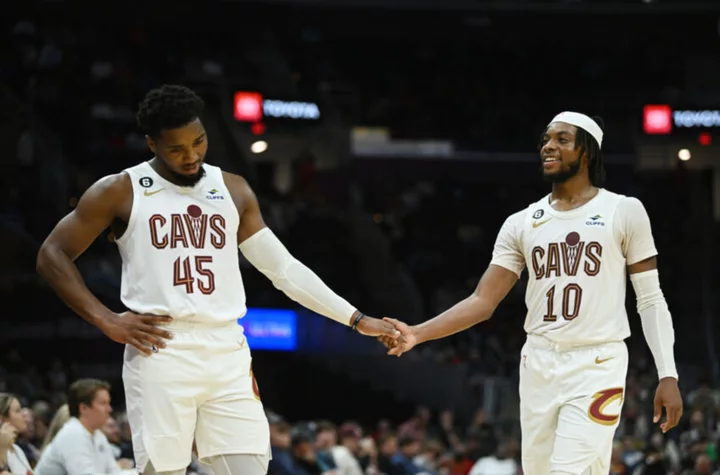
Cavs projected lineup and rotations heading into 2023-24 season
The Cleveland Cavaliers are bonafide contenders on paper, but last season ended with a rather embarrassing first-round exit. Now it's up to J.B. Bickerstaff andcompanyto avoid the same outcome in 2023-24.The Cleveland Cavaliers finished last season with the fifth-best record in the NBA. By ...
2023-08-03 23:50

Tomasz Waga: Cannabis factory pair linked to murder jailed
A cannabis operation in Cardiff was discovered when a man who tried to steal drugs was murdered.
2023-08-03 23:22
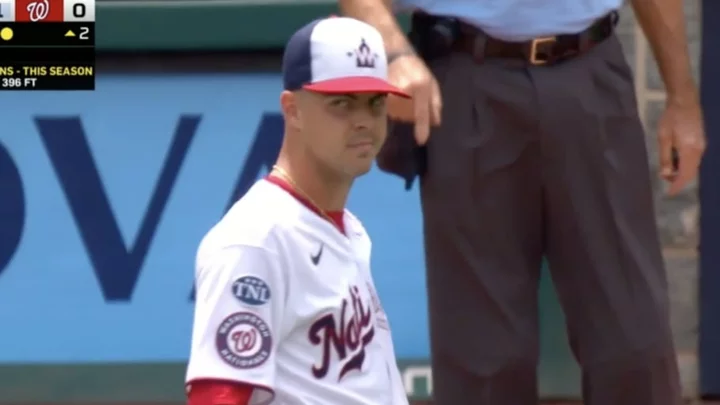
Nationals Pitcher and Announcers Disgusted With Angel Hernandez's Horrible Strike Zone
VIDEO: Angel Hernandez's missed calls from his first game behind the plate since April.
2023-08-03 23:17
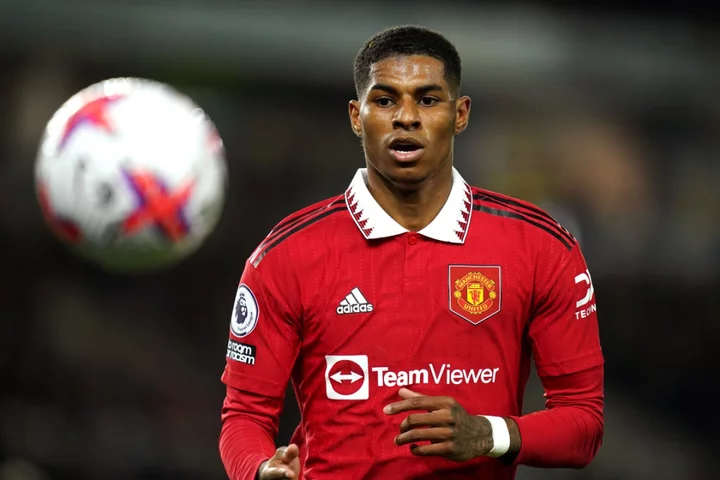
Marcus Rashford: Wayne Rooney wants me to break his Manchester United record
Marcus Rashford has revealed how Wayne Rooney is willing him to break his Manchester United goalscoring record. Rooney tops the list of all-time scorers at Old Trafford with 253, but having recently signed a new five-year contract, 25-year-old Rashford looks in a good position to one day overhaul that tally. The 30 goals he scored last season, which was the most prolific campaign of his career, saw him move to 123 and more look set to follow with Erik ten Hag seemingly unlocking Rashford’s full potential. And Rashford says the man whose record he wants to take is cheering him on. Asked by Gary Neville on the Overlap, in partnership with Sky Bet, whether he can surpass Rooney’s record, he said: “Hopefully I will. “You never know what’s going to happen, but I’m all about scoring goals and trying to make assists. There’s definitely a chance that it can happen. “I’ve actually spoken to Wazza about it – he wants me to do it. “He said it would be good for me to do it as I’ve grown up at the club. Hopefully I get the opportunity to try and make it happen.” After such a prolific season last term, Rashford believes he could hit 40 goals if he can stay fit in the forthcoming season. “Before last season, I always said let’s get to 20 – for a winger a good benchmark,” he added. “But this season, I’ve hit 30 so we have to try and push it now and go above and beyond. “Towards the end of the season, I was struggling with a few injuries, and I probably wasn’t quite at it – that’s when the goals started to dry up a little bit. “If I can keep that side of it under taps, I feel like I can go on and get 35 or 40.” United look well placed to finally start challenging again under Ten Hag’s strict regime. Rashford felt the force of the disciplinarian last season when he was dropped from the starting XI for the game at Wolves after being late for a team meeting. The forward came off the bench to score the winner in a 1-0 victory, but revealed he was just one minute late. “I learned from pre-season, a couple of the lads were late and it was important to implement his rules there and then,” said Rashford, who also “100 per cent” agreed with Ten Hag’s decision. “I wasn’t even that late – I don’t think he was being harsh, late is late – but it was probably about 45 seconds, a minute late. “I already knew what was going to happen because of the rules he implemented in pre-season. “I am not going to sit and argue about it, because we’ve got a game to win. There is a time and place to speak to him, but if we win the game nobody really cares.” Read More Charity boss speaks out over ‘traumatic’ encounter with royal aide Ukraine war’s heaviest fight rages in east - follow live Castleford complete shock loan signing of Leeds half-back Blake Austin Josko Gvardiol set for Manchester City medical after £77.5m deal agreed Jack Crowley gets chance to stake claim for World Cup spot against Italy
2023-08-03 22:57
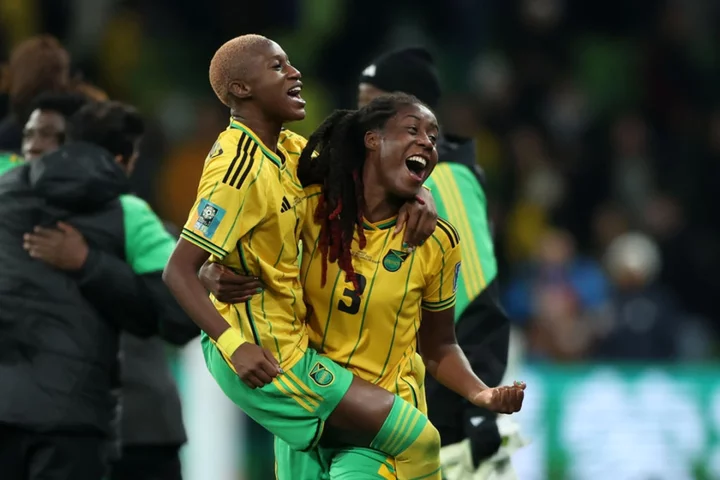
How the Women’s World Cup delivered its greatest ever group stage — against all the odds
The upsets at the Women’s World Cup group stage started on the opening day and ended with the biggest of all. Germany, the two-time champions and among the tournament favourites, are out before the quarter-finals for the first time in their history, a result that ranks as both the most stunning shock the tournament has ever seen, while also simply continuing the theme of the greatest group stage ever played at the Women’s World Cup. After all, hadn’t we learned to expect the unexpected? A 1-1 draw against South Korea sealed Germany’s fate, following their dramatic 2-1 defeat to Colombia earlier in Group H. It meant Morocco, making their Women’s World Cup debut, progressed ahead of the side who thrashed them 6-0 in the opening round. The first-ever 32-team Women’s World Cup and the decision to expand from 24 teams has been a resounding triumph: rather than creating a more predictable group stage, it has done the opposite and led to wonderfully chaotic, thrilling tournament football. Germany, Canada and Brazil, all sides ranked in the top 10 in the world, are out, while Jamaica (43rd), South Africa (54th) and Morocco (72nd) are through to the last-16. It can no longer be said that the group stages of the Women’s World Cup are a foregone conclusion and that the tournament only starts when the knockouts begin. New Zealand’s opening victory against Norway set the tone, with Colombia’s last-second win against Germany standing out as the highlight of a tournament that has so far had it all. To add to that, Jamaica reaching the last-16 with their draw against Brazil, Nigeria’s stunning victory against Australia, and South Africa’s dramatic comeback against Italy were all brilliant moments from a group stage that delivered the unpredictability and drama of knockout football. The number of shocks and upsets throughout illustrated that the progress and development of women’s football since the last World Cup has been felt just as much throughout the world than its traditional powers. The gap to the top has closed: the professionalisation of top European leagues and beyond has improved standards at the biggest clubs, and is providing more opportunities to players from across the globe. Several countries that do not have a strong domestic league, such as Colombia and Jamaica, instead now feature a core of players who are based in Europe. It means that even if playing conditions are lacking within their national organisations, players such as Colombia and Real Madrid’s Linda Caicedo, Nigeria and Barcelona’s Asisat Oshoala, and Jamaica and Manchester City’s Khadija Shaw are able to raise standards and expectations when they return to their national teams. The level of coaching has also improved, with teams who are not among the traditional powers now confident in setting up organised, defensive structures in order to restrict the attacking talents of their more favoured opponents. The goalkeeping at this World Cup has also taken another huge step forward, which has been proved by player-of-the-match displays from Nigeria’s Chiamaka Nnadozie, Philippines’ Olivia McDaniel, Ireland’s Courtney Brosnan and Jamaica’s Rebecca Spencer. Strong defensive bases have made teams more resilient, and upsets possible. The World Cup needed this, too, and the decision to increase the field to 32 teams has paid off more than anyone expected. There were some fears that the expansion had come too soon, and that certainly would have been the assessment had the seeded teams all coasted through unopposed, as they did in 2019. But that was not the case and there were only a handful of one-sided contests, with the majority of groups going down to the final round, setting the stage for classic World Cup drama. Morocco led the eight teams making their debuts at the World Cup, but most of the others had moments to celebrate. Haiti deserved more from Group D but shone in their display against England. Ireland were also unlucky to only come away with a point, but their performances against Australia and Canada made an impact back home and there will be a homecoming parade in Dublin. Portugal were one of the most tactically and technically interesting sides at the tournament and were inches away from knocking out the USA. Philippines and Zambia, who were ultimately a disappointment, both had historic wins and sparked moments of national celebration. The question, and obvious hope before the World Cup, is how those moments inspire further progress and, crucially, investment. Many of the debuting countries did far more than that at their first World Cup, offering competitive performances, and they can look at how Jamaica and South Africa have battled against the odds to improve from four years ago. Both Jamaica and South Africa lost every game when they made their debuts in France, but have now advanced to the knockout stages four years later. But what also makes Jamaica and South Africa’s success even more remarkable is what they have had to overcome. Their success is owed to the players and the work of their immediate support staff, and that alone. Along with Nigeria, they have reached the knockout stages despite their federations, not because of them. Before the World Cup, Jamaica’s players said their preparations for the tournament had been disrupted by a lack of financial support, planning and communication from the Jamaica Football Federation. They went public with their grievances in an open letter to the JFF, where they expressed their “utmost disappointment” that training camps and warm-up fixtures had not been organised before the World Cup. At the same time, Jamaica have relied on two separate crowdfunding campaigns to help cover the costs of their travel to Australia and New Zealand. After their historic qualification to the 2019 World Cup, which was also supported by crowdfunding campaigns, led by Cedella Marley, the daughter of Bob Marley, it felt like Jamaica were back to square one as the progress they had fought for off the field had not been matched by meaningful change off it. Yet the response of the players has been to aim higher and further, despite the lack of support or respect they have been shown. After knocking out Brazil, Jamaica’s progress was hailed as “undoubtedly the proudest moment in Jamaica’s football history” by the country’s sports minister Olivia Grange. However, it should also come as a moment of huge embarrassment to the country’s federation, with Jamaica’s success actually creating a spotlight for the lack of support they have received. “We put the dispute to bed for the tournament but the better we do, the more pressure it creates,” said Jamaica’s goalkeeper Rebecca Spencer after keeping a famous clean sheet against Brazil. "We hope they’re looking at us and do what they should be doing." The federations of South Africa and Nigeria are under the same spotlight. South Africa’s first-ever World Cup win against Italy to seal their spot in the last-16 capped a stunning turnaround after their players went on strike before the tournament, boycotting their final warm-up game against Botswana over bonus payments and player contracts. The dispute centred around Fifa’s prize money for the World Cup and a guarantee that it would be distributed to the players. Before the World Cup, Fifa announced an increase in its total prize money to $152m (£126m), which included a payment of £30,000 (£24,000) for each player at the tournament. For the players representing South Africa and Nigeria, that is set to double after reaching the last-16, a life-changing sum, but the prize money will only be distributed to the players by the federations, it does not mean players are guaranteed to receive it. It created uncertainty for South Africa, who only reached an agreement with their federation that their money would be released days before the tournament. The picture looks less certain for Nigeria, who were locked in their own pay dispute with the federation before the World Cup. Nigeria’s head coach Randy Waldrum has said he hasn’t been paid in seven months, and that some players had not been paid in two years. After Nigeria stunned Australia in the group stages, former England and Arsenal striker Ian Wright simply tweeted: “Pay them”. There may be people within some of the federations who point to the success stories of the Women’s World Cup as evidence that developments in the game are creating an equal playing field, and that further financial support is not merited. The reality and the lesson throughout this brilliant group stage is that if this is what can be achieved despite the lack of support, imagine what could be done if there was. With that in mind, there is no reason why any team inside the top-50 in the world shouldn’t be capable of the same if the right foundations are built. For now, those teams who have stunned the World Cup and remain at the tournament can continue to show why it was wrong not to support them before their unexpected success. Read More Women’s World Cup TV schedule: How to watch every match today Women’s World Cup golden boot: Who’s leading the top-scorer standings? When do England play next? Women’s World Cup fixtures and route to the final Brazil and Marta exit World Cup as Jamaica makes history When does USWNT play next? World Cup schedule and route to the final Germany suffer Women’s World Cup elimination after South Korea draw
2023-08-03 22:56
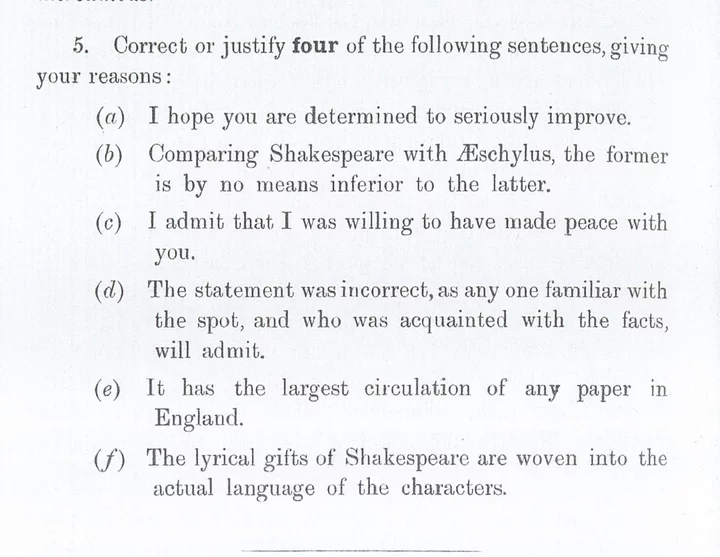
This Cambridge exam question is still baffling people 110 years after it was first published
A 110-year-old English language question formerly used in Cambridge English exams is absolutely baffling people over a century later. Exams at school and university are typically not things people look back on with fond memories, but it’s something we do in order to progress academically. For those who sat the very long Cambridge exam wishing to become an English language teacher back in 1913, they may well have been haunted by a question that continues to confuse people in the year 2023. In celebration of 110 years of the Cambridge English exam, the question has been released, but can you solve it? The question comes from the June 1913 Certificate of Proficiency in English exam, which was sat by three people and cost £3 at the time. Sign up to our free Indy100 weekly newsletter It was a gruelling 12-hour long exam and included sections on dictation, translation, and phonetic transcription. Today, more than 6 million people each year take the C2 Proficiency test, as it is now known. Francesca Woodward, Managing Director for English at Cambridge, said in a statement: “From just three candidates, we now open doors for millions of people every year to learn and teach English. "The historical papers from our archives paint a fascinating picture of how much has changed when it comes to learning English with Cambridge.” The question asks the candidates to “correct or justify” four of six different statements and to explain their reasoning. The first statement said: “I hope you are determined to seriously improve.” The second read: “Comparing Shakespeare with Aeschylus, the former is by no means inferior to the latter.” The third says: “I admit I was willing to have made peace with you.” The fourth reads: “The statement was incorrect, as any one familiar with the spot, and who was acquainted with the facts, will admit.” The fifth said: “It has the largest circulation of any paper in England.” And the sixth said: “The lyrical gifts of Shakespeare are woven into the actual language of the characters.” Cambridge highlights that what was deemed the correct English over 100 years ago may be different from now. Here are the answers: 1) This is a split infinitive and should be avoided in formal writing. The correct wordage would be, “seriously to improve”. 2) This statement is incorrect because it is a hanging participle and unintentionally modifies the wrong noun in a sentence. Alternatives that would be correct include, “Shakespeare is by no means inferior to Aeschylus” or “Shakespeare is just as good as Aeschylus”. 3) This statement uses the wrong tense and should read, “to make peace”. 4) Again, this uses the incorrect tense. The words “will admit” should instead be “would admit”. 5) and 6) are correct but candidates would have to explain why no changes are necessary. Have your say in our news democracy. Click the upvote icon at the top of the page to help raise this article through the indy100 rankings.
2023-08-03 22:51
